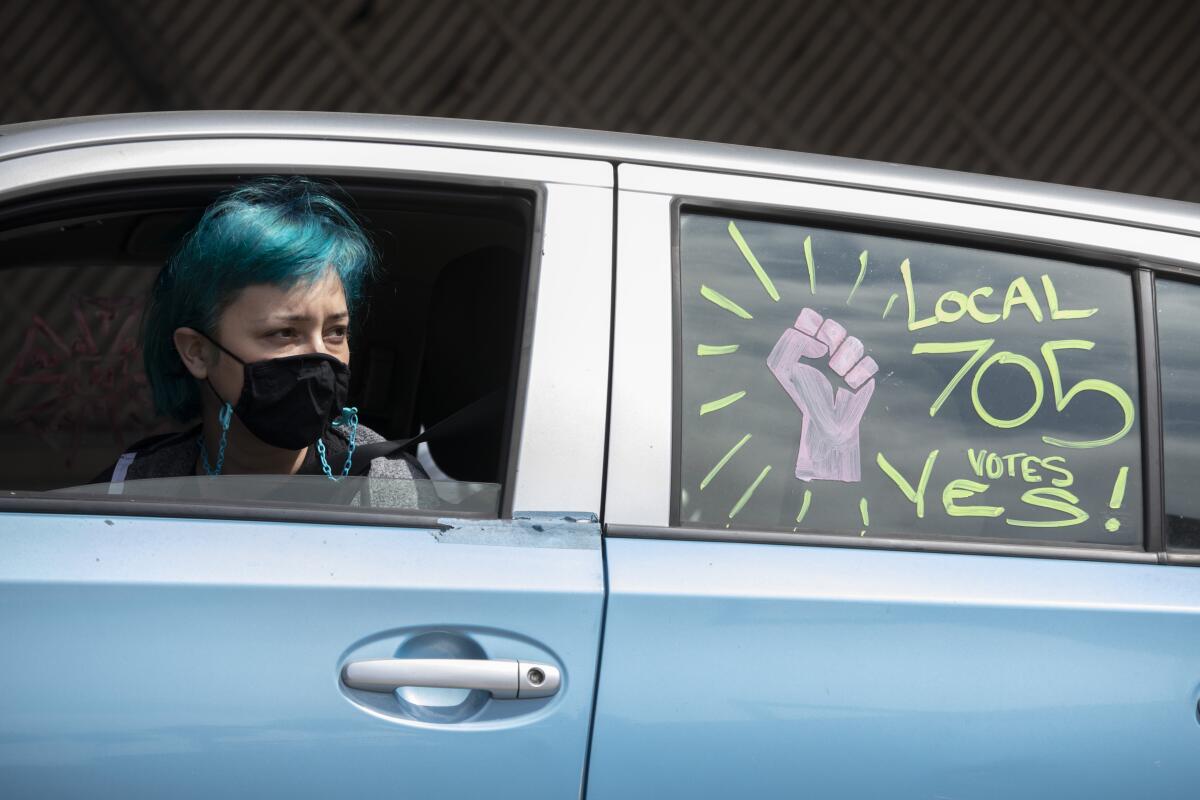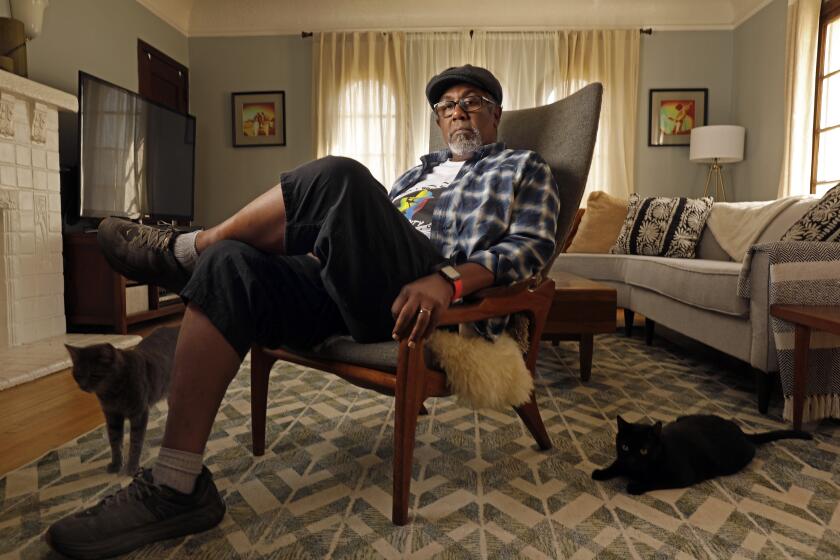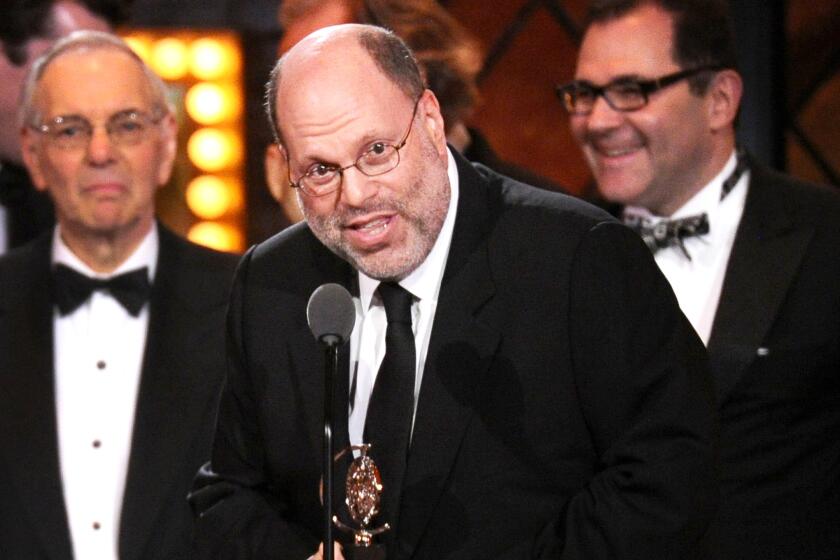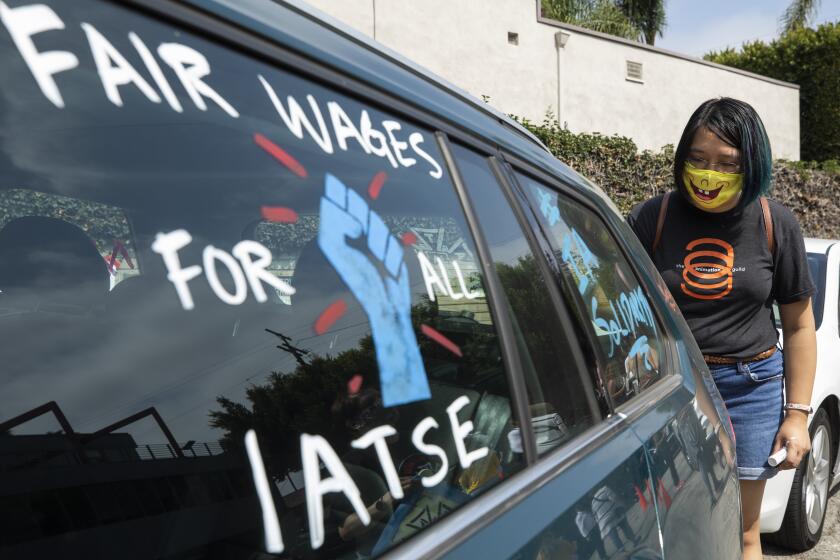With the IATSE strike vote, film and TV crews are saying what is on a lot of other workers’ minds

Earlier this week, union members representing more than 60,000 film and TV workers gave the International Alliance of Theatrical Stage Employees permission to call for a strike if the Alliance of Motion Picture and Television Producers doesn’t offer them a better deal.
Known quaintly and slightly condescendingly as “below-the-line workers” (ostensibly because production costs are listed separately on a budget, below the fees for writers, actors, producers and directors), this disparate group includes costume designers, cinematographers, production designers, gaffers and grips. So they aren’t asking for crates of Fiji water delivered daily or bowls of M&Ms with all the green ones removed. They aren’t demanding access to private jets or awards-season gifting suites.
For the record:
6:14 a.m. Oct. 8, 2021An early version of this story misspelled Stacy Perman’s first name as Stacey.
What they want: days that are closer to 10 hours than 16, time off each week to recuperate and live their lives, adequate health insurance and a work environment that doesn’t endanger them physically, mentally or financially. As many of them recently told my colleagues Anousha Sakoui and Stacy Perman, they have simply had it with the notion that they have to perpetually “pay their dues” (except their union dues).
It is the first time in IATSE’s 128-year history that members have authorized a strike — and if the producers’ alliance thinks the move is just a bit of public theater then they haven’t been paying attention.
After a year and a half of plague, protest, climate catastrophes and political mayhem, a big ol’ Hollywood shutdown seems absolutely on brand. Consider the general mood of all sorts of American workers, many of whom have also had it with the notion that they must somehow earn the right to a 40-hour work week, decent healthcare and a living wage.
Film crews are tired of tough working conditions and low pay from streaming companies and preparing to strike.
IATSE’s strike vote comes at a time when millions are feeling burned out and fed up, when wage-earners up and down the pay scale are pushing back against a work culture that increasingly demands too much, often for too little.
Amazon drivers, Hollywood assistants, home-care aides, festival interns, Gannett journalists, teaching assistants and even Goldman Sachs junior analysts have recently gone public about the seemingly insatiable demands of their professions. When schools and childcare facilities were shut down during the pandemic, working parents, especially mothers, realized there really was no safety net, or any interest in building one, and millions of women were forced out of the workplace.
In what has come to be known as “the great resignation,” a slew of workers, frustrated with companies that offer no advancement, few benefits and paltry-to-nonexistent health or safety protections even in the face of a pandemic, simply quit their jobs — 4 million in April alone.
As the country reopened, many businesses struggled to re-staff. In certain quarters it is said that all those “help wanted” signs for part-time, low-wage gigs are proof that “some people” simply don’t want to work, or that bratty young folks are unwilling to put in the work. Many more believe they signal the need to raise the minimum wage, stop insisting that any job is better than no job (a recipe for all manner of abuses) and put an end to the belief that decent wages and working conditions are something certain groups must earn by working many years without them.
Rudin says he’s stepping back from Broadway and film projects. But few big players in Hollywood have spoken up about recent allegations of bullying.
Hollywood, like many industries, prides itself on the truism that anyone lucky enough to work in its hallowed halls needs to “pay their dues.” The fact that those dues often include sexual harassment and assault, emotional and physical abuse by toxic bosses and the unquestioned demand that underlings put work above family, friends and mental health isn’t beside the point: It is the point.
All that dues-paying is seen as natural selection; you put up with your horrible boss to prove that you’re tough, you have what it takes. You regularly work weekends and holidays because that’s how you show you’re dedicated, a “team player”; in a crunch, you can be counted on to come through.
There will always be crunches, times when every type of employee must rally and work a bit harder. But in too many workplaces “crisis mode” has become the new norm. As several IATSE members (who asked for anonymity) told me recently, the fact that a crew can put in a string of 18-hour days in an emergency doesn’t mean they should, or that it should be expected on a regular basis.
Why the IATSE strike vote is so important? Because most Americans are below-the-line workers. Film and television crews are giving voice to universal truths: People can love to work and still expect a lunch break. They can feel fortunate to be in their chosen industry and still demand to be fairly compensated. They can dedicate themselves to excellence on the job and still expect to have time to live their lives outside work.
Not just on film and television sets, but everywhere.
No one wants a strike, particularly now that “White Lotus” has a second season order. But when a historically mild-mannered union calls for and gets its first strike authorization in more than a century, well, every big employer in every single industry should probably start paying attention.
Earlier this month, the International Alliance of Theatrical Stage Employees voted in support of waging a strike if the union couldn’t agree to a new contract.
More to Read
The biggest entertainment stories
Get our big stories about Hollywood, film, television, music, arts, culture and more right in your inbox as soon as they publish.
You may occasionally receive promotional content from the Los Angeles Times.














